A Look at Global Warming
Fred Gielow
Posted here June 5, 2017
You Don't Say homepage.
Source of background graphic.
Let's take a look at what the media have been telling us over the years.
"Geologists Think the World May Be Frozen Up Again"
. . . -- New York Times
"Professor Schmidt Warns Us of an Encroaching Ice Age"
. . . -- New York Times
"Fifth Ice Age Is on the Way. Human Race Will Have to Fight for Its Existence against Cold"
. . . -- Los Angeles Times
"Scientists Say Arctic Ice Will Wipe out Canada"
. . . -- Chicago Tribune
"Ice Age Coming Here!"
. . . -- Washington Post
These headlines (above) of frightening, dangerous global cooling appeared from 1895 to 1922. Then the story changed.
"Most Geologists Think the World Is Growing Warmer, and That It Will Continue to Get Warmer"
. . . -- Los Angeles Times
"We Have Learned That the World Has Been Getting Warmer in the Last Half Century"
. . . -- New York Times
"Nearly All the Great Ice Sheets Are in Retreat"
. . . -- New York Times
"Arctic Findings in Particular Support Theory of Rising Global Temperatures"
. . . -- New York Times
"Arctic Pack Ice Is Thinning and the Ocean at the North Pole May Become a Sea Within a Decade or Two"
. . . -- New York Times
These headlines (above) of frightening, dangerous global warming appeared from 1929 to 1969. Then the story changed.
"How Long the Current Cooling Trend Continues Is One of the Most Important Problems of Our Civilization"
. . . -- Science News
"Get a Good Grip on Your Long Johns, Cold Weather Haters, the Worst May Be Yet to Come"
. . . -- Washington Post
"Colder Winters Herald Dawn of New Ice Age"
. . . -- Washington Post
"Present Climate Change Will Result in Mass Death by Starvation and Probably in Anarchy and Violence"
. . . -- New York Times
"The North Atlantic Is Cooling Down About as Fast as an Ocean Can Cool"
. . . -- Christian Science Monitor
"The Central Fact Is the Earth's Climate Seems to Be Cooling Down"
. . . -- Newsweek
"A Major Cooling Widely Considered to Be Inevitable"
. . . -- New York Times
"The Cooling Since 1940 Has Been Large Enough and Consistent Enough That It Will Not Soon Be Reversed"
. . . -- Science News
"The Threat of a New Ice Age Must Now Stand Alongside Nuclear War as a Likely Source of Wholesale Death and Misery for Mankind"
. . . -- New Scientist
These headlines (above) of frightening, dangerous global cooling appeared from 1969 to 1981. Then the story changed. Yet again!
"Global Warming of an Almost Unprecedented Magnitude Is Predicted"
. . . -- New York Times
"Rising Temperatures Could Literally Alter the Fundamentals of Life on the Planet
. . . -- Washington Post
"Polar Ice Caps Are Melting Faster Than Ever. By Any Measure, Earth Is at the Tipping Point, the Climate Is Crashing, and Global Warming Is to Blame"
. . . -- Time
|
Do you begin to see a pattern here? How many times are you willing to ride around on the merry-go-round, with fear and trepidation? How many times will you blindly swallow what the media tell you about global warming . . . or cooling . . . or whatever? How come science gets it so wrong so many times? How many times does the story have to change before we become suspicious about what we read in the newspapers and watch on TV?
Environmental extremists are bound and determined to convince us it's global warming. To advance their wishes for global government and wealth redistribution, they publish fake data, push fake stories, and scream bloody murder when their scams don't seem to work on us. (References: 1. 2. 3.)
Just how is it environmentalists can claim CO2 is damaging irreparably this place we call Earth? Well, they write simulation computer programs that predict the effect of CO2 on the environment over five years, ten years, fifty years, a hundred years. What assumptions do they use for these programs? They make them up. What effect does water vapor have on the climate? They guess. What effect does CO2 have? They guess. What effect do sunspots have? They guess. And they guess and they guess and they guess. Then, they run the simulation. If they don't like the results, they "adjust" the assumptions, until they get an outcome they're satisfied with.
Let's look at the results of some of these simulations.
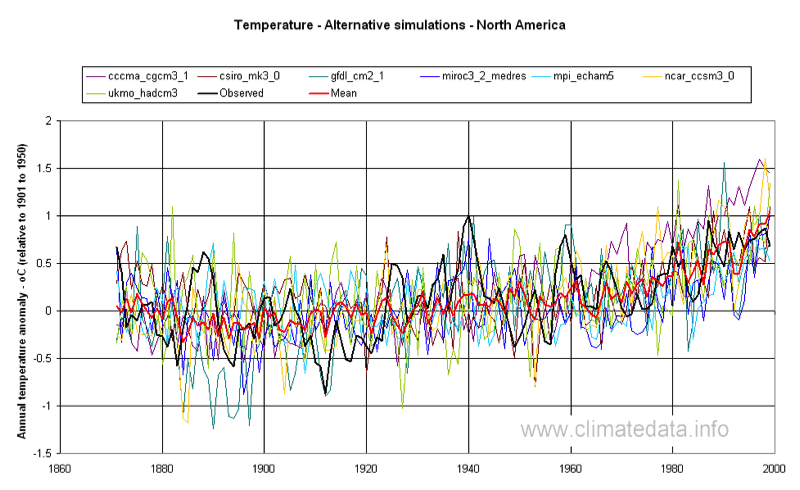
Source of chart.
This chart shows several temperature simulations for the period from 1870 to 2000. Hmm. Why aren't all the lines on top of one another? Good question! After all, we're looking at a period where we have a lot of historical data. Why don't all the simulations line up?
Because of all those tricky assumptions. The climate simulations are so flawed, they can't even get history right. So, why would we believe they could accurately predict temperatures for the next 100 years? Well, that would be foolish, wouldn't it? But, crazy simulation results like these are exactly what the climate fear mongers want us to swallow.
Now let's take a look at how well simulation models have predicted what has happened in the last 30 years.
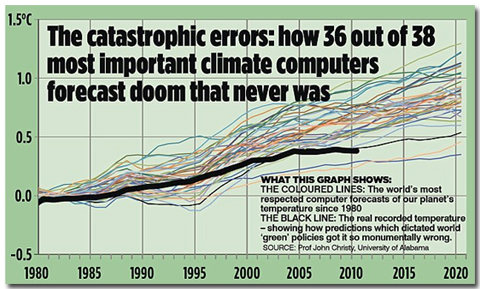
Source of chart.
Hmm. Not only are they off, they're way off. Some by a full half degree. Some by even more. Just imagine how ridiculous the results would be for the year 2050 or 2100. But the environmentalists say, "Believe!" The sky is falling. The earth is dying. Humanity is doomed.
|
Okay, let's talk about CO2 for a moment. We're told it's dangerous. We're told it's a deadly greenhouse gas. We're told it's the primary cause of the planet heating up (even though the planet isn't heating up right now). We're told it's all humanity's fault for producing so much CO2. We're told we must cut down on power usage because lots of CO2 is produced in the generation of many kinds of power. And on and on.
So, what percent is CO2 of all the greenhouse gases? What do you think? 80 percent? 50 percent? 10 percent? Take a guess.
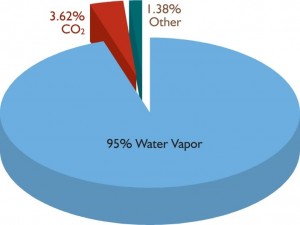
Source of chart.
Wait a minute! You mean to tell me the most prevalent greenhouse gas is water vapor? Simple, innocent water vapor? Well, isn't that inconvenient for the environmentalists! We shouldn't be worried about what we breath out, we should be worried about what we drink in!
And you know how we're told there has never been this much CO2 in the atmosphere? Ever before! And the levels are growing and growing and it's totally, totally unprecedented? And we're all going to die?
Well, this turns out to be -- how can I put this delicately? -- a total lie. The chart below shows that during the Pre-Cambrian period (about 550 million years ago) CO2 concentration levels were 15 times greater than today with no record of any catastrophic results.
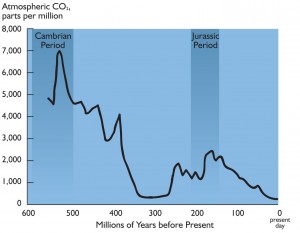
Source of chart.
And to add insult to injury to the environmentalists' scam, it turns out that increased CO2 is actually really good for the world. In fact, increased atmospheric concentrations of CO2 increased agricultural output and production by $3.2 trillion between 1961 and 2011. The documented effects of increased carbon dioxide in the atmosphere have been positive, not negative. (Source.)
|
Environmentalists certainly wouldn't admit CO2 made anything better. As a matter of fact, they have gone to a whole lot of trouble creating long lists of things that have been made worse because of CO2. Far, far, far worse. Here are some of them:
Acne
Afghan poppies destroyed
Africa devastated
African aid threatened
African summer frost
Aggressive weeds
Air pressure changes
Airport malaria
Alaska re-shaped
Allergy season longer
Alligators in the Thames
Amazon a desert
Amphibians breeding earlier (or not)
Ancient forests dramatically changed
Animals shrink
Antarctic ice grows, Antarctic ice shrinks
Antarctic sea life at risk
Algal blooms
Archaeological sites threatened
Arab Spring
Arctic tundra to burn
Atlantic less salty, Atlantic more salty
Attack of killer jellyfish
Avalanches reduced, avalanches increased
Baghdad snow
Bahrain under water
Beer shortage
Beetle infestation
Birds shrinking, birds confused, birds decline (Wales), birds driven north, birds return early
Blackbirds stop singing, blackbirds threatened
Blood contaminated
Brain eating amoebae
Brains shrink
Bread in smaller loaves
Bubonic plague
Butterflies move north
Camel deaths
Cannibalism
Childhood insomnia
Circumcision in decline
Cockroach migration
Coffee threatened
Conflict with Russia
Coral bleaching, coral fish suffer, coral reefs dying, coral reefs grow, coral reefs shrink
Cabbage shortage
Cougar attacks
Crabgrass menace
Crime increase
Crops devastated
Crumbling roads, buildings, and sewage systems
And that's just some of those . . . through the letter "C."
Here's a more complete list.
|
Don't doubt the environmentalists. Would they lie to you? Of course not!
They say that 97 percent of the world's scientists believe in global warming and that humans cause it. If they say it, it must be true, right?
Maybe not. Where, do you suppose, did that 97 percent number come from? It came from a 2009 response to a two question on-line survey (you know how notoriously unreliable those can be!). Only 5 percent of respondents, about 160 scientists, were actual climate scientists. In fact, the "97-percent" statistic was drawn from an even smaller subset: the 79 respondents who were both self-reported climate scientists and had "published more than 50% of their recent peer-reviewed papers on the subject of climate change." These scientists agreed that global temperatures had generally risen since 1800, and that human activity is a "significant contributing factor." (Source.)
It's rather a no-brainer that world temperatures have risen since 1800. After all, we've been coming out of the Little Ice Age. That's what temperatures do when you come out of an ice age. But that has nothing to do with CO2!
And what is a "significant contributing factor?" Is it 5 percent? Maybe. Is it 1 percent? Maybe. Is it 0.05 percent? Maybe. So the answer is we don't know what the scientists considered a "significant contributing factor."
There have been other studies since 2009 with also-strained determinations of a 97 percent number. A National Review article sets the record straight: "There is no basis in fact for saying that 97 percent of scientists believe that climate change is real, man-made, and dangerous."
In a petition, more than 30,000 American scientists urged the U.S. government to reject the Kyoto treaty. Thus, there is hardly unanimity among scientists about global warming or mankind's role in producing it. (Source.)
All right, let's say, just for the sake of argument, that we decide to reduce CO2 in the world. Yes, humans produce lots of CO2, but CO2 comes from a whole lot of other sources. Take a look.
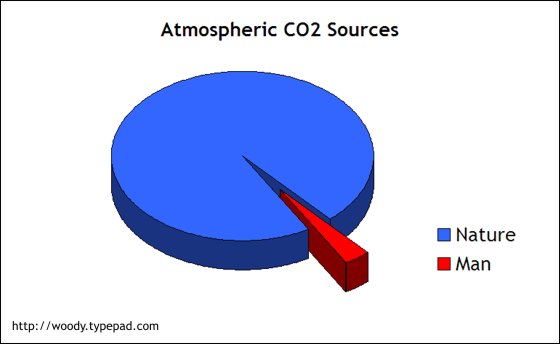
Source of chart.
Hmm. Looks like mankind produces only about 3 percent of the world's atmospheric CO2. So, if we reduce all of the human-produced CO2 (that would include our breathing out), that would only have a 3 percent effect on the total CO2 in the atmosphere.
|
One way to gauge the trustworthiness of those who want us to believe them is to see how trustworthy they have been in the past. Are their statements well thought out? Are their remarks straightforward? Have their predictions come true?
Let's take a look at some of the predictions we've heard from "respected" and "knowledgeable" individuals over the years.
o "Dr. S. Dillon Ripley, secretary of the Smithsonian Institute, believes that in 25 years, somewhere between 75 and 80 percent of all the species of living animals will be extinct."
. . . -- Senator Gaylord Nelson, 1970.
o "Demographers agree almost unanimously on the following grim timetable: by 1975 widespread famines will begin in India; these will spread by 1990 to include all of India, Pakistan, China and the Near East, Africa. By the year 2000, or conceivably sooner, South and Central America will exist under famine conditions. By the year 2000, thirty years from now, the entire world, with the exception of Western Europe, North America, and Australia, will be in famine."
. . . -- Peter Gunter, professor at North Texas State University, The Living Wilderness, 1970.
o "The death rate will increase until at least 100-200 million people per year will be starving to death during the next ten years."
. . . -- Paul Ehrlich, 1970.
o "By 1985, air pollution will have reduced the amount of sunlight reaching earth by one half."
. . . -- Life Magazine, 1970.
o "Civilization will end within 15 or 30 years unless immediate action is taken."
. . . -- George Wald, Harvard biologist, 1970.
o "It is already too late to avoid mass starvation."
. . . -- Denis Hayes, chief organizer for Earth Day 1970.
.
o "At the present rate of nitrogen buildup, it's only a matter of time before light will be filtered out of the atmosphere and none of our land will be usable."
. . . -- Kenneth Watt, ecologist, around 1970.
o "Since more than nine-tenths of the original tropical rainforests will be removed in most areas within the next 30 years or so, it is expected that half of the organisms in these areas will vanish with it."
. . . -- Paul Ehrlich, 1975.
o "The World as we know it will likely be ruined by the year 2000."
. . . -- The Environmental Fund, 1975.
o "Entire nations could be wiped off the face of the earth by rising sea levels if global warming is not reversed by the year 2000."
. . . -- Director of the UN Environment Programme's (UNEP) New York office, 1989.
o "[By 1996], a continent-wide black blizzard of prairie topsoil will stop traffic on interstates, strip paint from houses and shut down computers." The situation will get so bad that "Mexican police will round up illegal American migrants surging into Mexico seeking work as field hands."
. . . -- Michael Oppenheimer, Princeton professor and lead UN IPCC author, 1990.
o "[If] there's no action before 2012, that's too late."
. . . -- Rajendra Pachauri, former head of the Intergovernmental Panel on Climate Change, 2007.
o "We have hours to act to avert a slow-motion tsunami that could destroy civilization as we know it. Earth has a long time. Humanity does not. We need to act urgently. We no longer have decades, we have hours."
. . . -- Elizabeth May, leader of the Greens in Canada, 2009.
o "The entire North Polarized [sic] cap [the north pole ice cap] will disappear in five years."
. . . -- Al Gore, 2009.
o "[There are] only 50 days to save the world from global warming."
. . . -- UK Prime Minister Gordon Brown, 2009.
o "A growing body of evidence suggests that the kind of extreme cold being experienced by much of the United States as we speak is a pattern we can expect to see with increasing frequency, as global warming continues."
. . . -- John Holdren, White House Science "Czar," 2013 or 2014.
o "We have 500 days to avoid climate chaos."
. . . -- Laurent Fabius, France's foreign minister, May 13, 2014.
|
Oh yes, listen carefully to those fountains of wisdom. Their superior intellect and unsurpassed wisdom deserve respect and awe. And a great big belly laugh!
Better yet, listen to some voices of reason.
o "At least 90% of greenhouse warming is due to water vapor and clouds. Carbon dioxide is a bit player. There is little argument in the scientific community that a direct effect of doubling the CO2 concentration will be a small increase of the earth's temperature -- on the order of one degree. Additional increments of CO2 will cause relatively less direct warming because we already have so much CO2 in the atmosphere that it has blocked most of the infrared radiation that it can."
. . . -- Will Happer, Princeton physicist.
o "Atmospheric CO2 is the lowest for 500 million years. Climate has always been driven by the Sun, the Earth's orbit and plate tectonics -- and the oceans, atmosphere and life respond. Humans have made their mark on the planet, thrived in warm times and struggled in cool times. The hypothesis that humans can actually change climate is unsupported by evidence from geology, archaeology, history and astronomy. The hypothesis is rejected."
. . . -- Ian Plimer, Australian professor.
o "Let's be clear: the work of science has nothing whatever to do with consensus. Consensus is the business of politics. Science, on the contrary, requires only one investigator who happens to be right, which means that he or she has results that are verifiable by reference to the real world. In science, consensus is irrelevant. What is relevant is reproducible results."
. . . -- Michael Crichton, author.
o "[Climate change is the] greatest hoax ever perpetrated on the American people."
. . . -- Jim Inhofe, Republican U.S. senator from Oklahoma.
o "We believe Al Gore deserves an 'F' in science and an 'A' in creative writing."
. . . -- Cathy McMorris Rodgers, Republican U.S. congresswoman from Washington.
o "I do not believe that human activity is causing these dramatic changes to our climate the way these scientists are portraying it. . . . and I do not believe that the laws that they propose we pass will do anything about it. Except it will destroy our economy."
. . . -- Marco Rubio, Republican U.S. senator from Florida.
o "The last 15 years, there has been no recorded warming. Contrary to all the theories that they are expounding, there should have been warming over the last 15 years. It hasn't happened."
. . . -- Ted Cruz, Republican U.S. senator from Texas.
o "In spite of claims to the contrary, there is no reliable scientific evidence that polar bear numbers have declined in any subpopulation so far. Climate models have actually done a poor job of predicting climate warming and sea ice decline."
. . . -- Mitchell Taylor, polar bear scientist.
o "Probably the most widely repeated claim in the debate over global warming is that '97% of scientists agree' that climate change is man-made and dangerous. This claim is not only false, but its presence in the debate is an insult to science."
. . . -- Craig D. Idso, Ph.D., climatologist; Robert M. Carter, Ph.D., paleogeologist; and S. Fred Singer, Ph.D., physicist, in their book Why Scientists Disagree about Global Warming: The NIPCC Report on Consensus."
o "The sun is the source of the energy that causes the motion of the atmosphere and thereby controls weather and climate. Any change in the energy from the sun received at the Earth's surface will therefore affect climate."
. . . -- Eigil Friis-Christensen, Director of the Danish National Space Centre.
o "The Copenhagen Treaty that was almost signed in 2009 would have created a worldwide bureaucracy that could override, tax, and fine national governments. This was a narrowly-averted silent coup, with clearly flawed climate 'science' just an excuse. . . [We still face] the threat of a bureaucratic coup using climate as an excuse."
. . . -- David Evans, holder of six degrees, including a PhD from Stanford in electrical Engineering.
o "Global warming is pseudo-science. From 1880 to 2013 the temperature has increased from ~288K to 288.8K (0.3%). The temperature has been amazingly stable."
. . . -- Ivar Giaever, professor, Nobel Prizewinner for physics.
o "If you go to climate scientists, climatologists, the people who look at this, as opposed to the scientific community at large, you will find absolutely no consensus. Some think that manmade emissions of greenhouse gases are warming the climate, others do not."
. . . -- Bonner Cohen, senior fellow at the National Center for Public Policy Research.
o "The United States should be applauded for its emissions of CO2; for it is the ongoing rise in the air's CO2 content that will ultimately prove the salvation of the planet. How do we know that? Because carbon dioxide is the very elixir of life; the primary raw material upon which nearly all plant life -- and, hence, nearly all animal life (including man!) -- depends for its existence. And the more CO2 there is in the air, the better plants grow; and, consequently, the more food there is for human and animal consumption."
. . . -- Craig D. Idso and Keith E. Idso, Center for the Study of Carbon Dioxide and Global Change.
|
Since 1998, more than 31,000 American scientists from diverse climate-related disciplines, including more than 9,000 with Ph.D.s, have signed a public petition announcing their belief that ". . . there is no convincing scientific evidence that human release of carbon dioxide, methane, or other greenhouse gases is causing or will, in the foreseeable future, cause catastrophic heating of the Earth's atmosphere and disruption of the Earth's climate." (Source.)
Lots of Americans have figured it out. They're not buying into all the global-warming foolishness. According to an October 2016 in-depth survey by the Pew Research Center, nearly three-quarters of Americans don't trust that there is a large "scientific consensus" amongst climate scientists on human behavior being the cause of climate change. (Source.)
All the scares and dances of doom apparently haven't had their intended effect. People have been confronted with enough fake news to begin to recognize it when it comes along. They see global-warming talk for what it is: lies and deceit to advance an agenda.
And surely the Climategate email scandal hasn't helped the environmentalists' cause any. (Also.)
Here's what's at the heart of the whole global warming issue: Can it be proven conclusively that increases in CO2 are causing increases in the world's temperatures? Are increased CO2 concentrations driving temperature increases? There are many other questions to be answered, but this is where we must begin: Are temperature increases the direct result of CO2 increases?
To help answer that question, take a look at what has happened over the last 400,000 years.
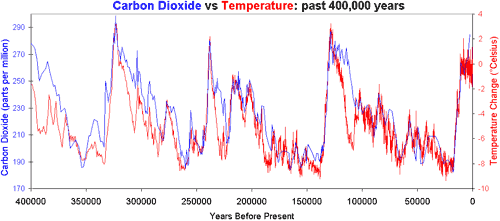
Source of chart.
Several interesting observations can be made with this chart. Yes, there appears to be a correlation between CO2 concentrations and global temperatures. But if you look closely, you'll see that temperature changes seem to lead CO2 changes. The article associated with the chart explains: "During this period, CO2 and temperatures are closely correlated, which means they rise and fall together. However, based on Antarctic ice core data, changes in CO2 follow changes in temperatures by about 600 to 1000 years. This has led some to conclude that CO2 simply cannot be responsible for current global warming." (Emphasis added.)
Another interesting observation: the Earth's temperature has been rising and falling for hundreds of thousands of years. Apparently these fluctuations are a natural phenomenon, and they occur without any catastrophic effect on life here. It's sort of like saying: Oh my gosh, the sun is rising. We'll all be roasted to death. This is a catastrophe! We have to have world government and wealth redistribution to solve this dreadful problem.
In the face of such panic, some might suggest we wait for the sun to set.
Now look at this chart.
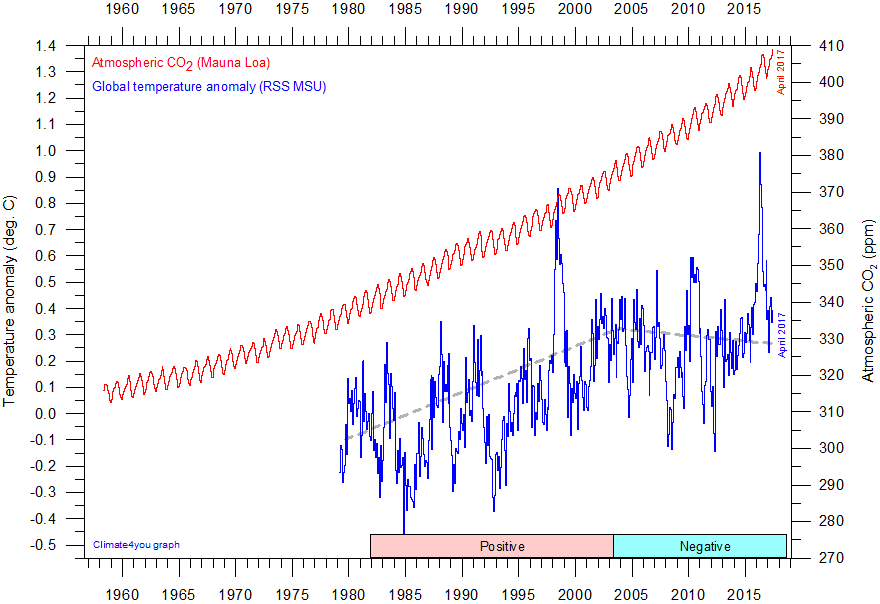
Source of chart.
Here it's clear that while CO2 concentrations in the atmosphere have continued to rise year to year, since 2004 the Earth's temperature has actually dropped. This inconvenient little truth invalidates all the computer models that predict massive global warming. And it also invalidates all those who have invested total belief in the global warming scam.
Though the global warming scare mongers tell us the Earth's temperature has reached new record highs each year, the data indicate that's just not the case, as you can see here.
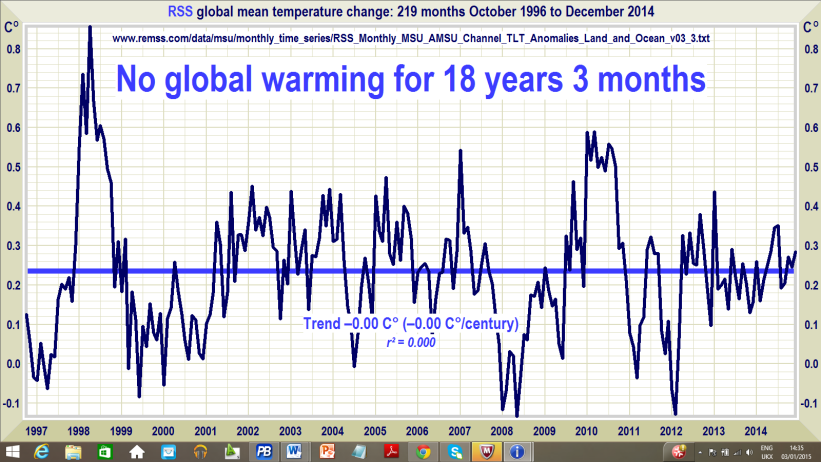
Source of chart.
|
The carbon dioxide, global warming crisis isn't a crisis at all. It's just a hoax to justify increased world government and massive wealth redistribution from wealthy countries like to United States to poor countries around the world. It's just a fabricated rationalization to justify moving the U.S. away from capitalism toward socialism.
(It's interesting to note that the U.S. has spent more than $166 billion on climate change! Source. Just imagine if this money had been spent on something worthwhile.)
|